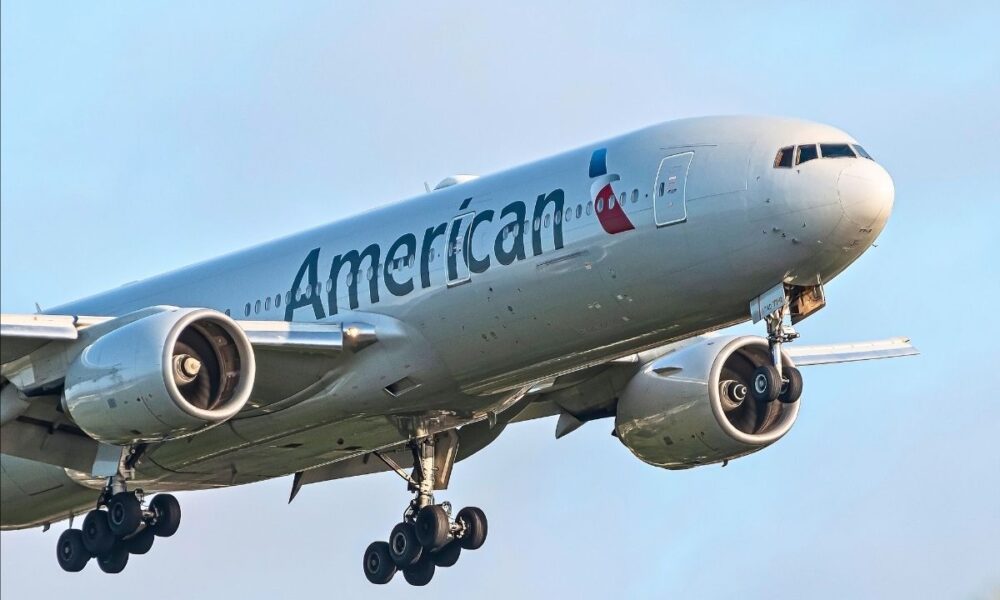American Airlines has slashed its reliance on foreign H-1B labor by more than half, according to newly released federal data.
The Fort Worth-based airline reported just 115 active H-1B visa beneficiaries through the second quarter of 2025, per the latest release from the U.S. Citizenship and Immigration Services (USCIS) H-1B Employer Data Hub. This marks a dramatic decline from the 271 H-1B workers AA reported in 2024, representing a 57% drop.
The Dallas Express reached out to American Airlines to inquire about the reason for the reduction in visa workers, but the company did not respond by the time of publication.
Despite the decline, the H1B Salary Database shows that AA continued to file new Labor Condition Applications (LCAs) for foreign hires set to begin work in 2025.
One such position was listed as “ANALYST SR. ANALYST, COMMERCIAL PLANNING AND ANALYSIS” with a yearly compensation rate of $84,000. The federal prevailing wage range for similar roles in the Dallas-Fort Worth area ranges from approximately $60,000 to $120,000, with a mean wage of around $100,000, according to the OFLC Wage Search function. Data from ZipRecruiter places the average salary for a senior analyst in Fort Worth at $98,165.
The H-1B program allows companies to bring in foreign workers for up to six years in roles that require “a body of highly specialized knowledge,” according to USCIS. But critics have long argued the system is used to undercut wages and sidestep domestic hiring.
As The Dallas Express previously reported, AA ranked as the 11th largest user of H-1B labor in Texas last year, sandwiched between tech and consulting giants. Many of the roles filled by H-1B visa holders were entry- and mid-level business analyst and IT positions—jobs that Texas colleges and universities train thousands of students to fill each year.
Texas is home to numerous business and technology programs, including those at UT Austin, Texas A&M, and Texas Christian University. The Lone Star State also hosts major business hubs in Dallas-Fort Worth and Houston, and boasts a sizeable tech sector in Austin.
According to the Department of Labor, the original intent of the H-1B program was to help companies that “cannot otherwise obtain needed business skills and abilities from the U.S. workforce.” Yet in practice, labor advocates allege the program has often been used to suppress wages, replace American workers, or expand margins through lower-cost labor.
The AFL-CIO-affiliated Department for Professional Employees (DPE) has stated in its 2025 fact sheet that “Employers can and do underpay H-1B workers,” noting that 60% of H-1B roles in FY2019 were paid at the lowest two federally permissible wage levels. The group also flagged coercive employment dynamics: “If an H-1B worker says no, they risk being terminated and losing their legal status in the United States.”
This phenomenon could have industry-wide effects, driving wages for all workers in a field.
Some institutions have issued counterreports. “H‑1B workers are highly paid: their wages are in the 90th percentile of all wages in the United States, meaning that they have wages in the top 10 percent of U.S. wage earners,” a 2021 blog post on the CATO Institute website read.
However, it is worth noting that this blog post compares the wages of often college-educated H-1B workers with the wages of the entire American workforce.
The drop in visa usage at AA coincides with a broader wave of cost-cutting and operational restructuring.
In April, the Houston Chronicle reported that American Airlines was trimming its customer service presence, reducing gate agent coverage on under-capacity flights and slashing service shifts at key airports, such as Chicago O’Hare. The airline had already laid off hundreds of customer service workers in early 2024, including 321 employees in DFW.
Amid declining domestic travel demand and lingering damage from the January collision involving Flight 5342, AA projected a Q1 2025 loss of up to 80 cents per share, Chron reported.
The travel downturn has also affected other major carriers, including Delta and Southwest.
Despite American’s decreased dependence on H-1B labor, it stands apart from other Texas travel companies, such as Buc-ee’s, which appeared to have zero H1-B workers, The Dallas Express reported.


